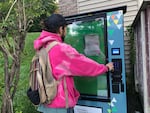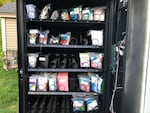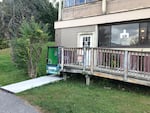
Brian taps in the code to dispense fentanyl test strips from the new harm reduction vending machine in North Adams, MA. Anyone can get the test strips for free. But to receive drug-use supplies like needles and pipes, clients of the nearby clinic must register for an access code. The machine is cooled and heated to preserve medications like Narcan.
The small city of North Adams, nestled in the Berkshires of western Massachusetts, is well-know as a hub of contemporary art, a bucolic haven for stressed New Yorkers, and an autumn leaf peeping destination.
But few of the tourists may know that North Adams and other parts of western Massachusetts have been deeply scarred by the opioid epidemic.
Most recently, the communities are grappling with the impacts of fentanyl, a deadly synthetic opioid, and xylazine, an animal sedative that is being added to the drug supply, and can cause serious skin wounds.
Recently, an unusual vending machine appeared on the streets of North Adams. It dispenses clean syringes, pipes for smoking crack or methamphetamine, Narcan to reverse opioid overdoses, condoms and more.
The vending machine, decorated with a lattice of colorful triangles, sits just outside the entrance to Berkshire Harm Reduction, a clinic where staff members hand out the same items during weekday business hours.
The vending machine has many items — like Narcan and condoms — that are available for free to anyone passing by.
But some of the items related to drug use, like clean needles and glass pipes, can only be accessed by clinic clients who have a special code, and may want them at times when the clinic is closed. After all, drug use happens at all hours, every day of the week.
“I don’t shoot up that much,” said Brian, one of the clients. “But someone will give me something and if it’s late at night, I don’t want to use their needle but I really want to do this, you know. ”
Previously, Brian would try to clean needles with bleach to avoid exposing himself to hepatitis C, a virus that can spread through intravenous drug use. (NPR agreed to identify Brian by his first name because he buys and uses illegal drugs.)

Harm reduction vending machines can be tailored for the items each program or clinic wants to distribute, and contains temperature controls to help preserve medications like Narcan.
The vending machine was installed in August. Now Brian can get clean needles when he needs them, and no longer has to worry about catching an infectious disease.
He can also get test strips to check if the crack he smokes also contains the powerful opioid fentanyl, which has been linked to hundreds of thousands of overdoses in the U.S.
There are even wound care kits to treat the skin lesions that are becoming more common with xylazine, an animal tranquilizer found in the drug supply.
Overdose deaths dropped over the last year nationwide and in Massachusetts, but overdoses continue to claim about 100,000 lives each year.
Reducing harms and risks of drug use
The rates remain higher than before the COVID pandemic, and many communities are looking for solutions to curb overdoses and address the other serious health effects of an increasingly toxic drug supply.
Replacing potato chips and candy with needles and Narcan is a relatively new strategy in the drug policy approach known as “harm reduction.”
Harm reduction is a response to drug users that focuses on compassion and care, instead of criminalization and condemnation.
Practitioners often provide free supplies geared toward saving lives and reducing the spread of diseases, and they treat medical conditions to keep clients healthy, whether or not they are ready to stop using drugs.
Machines vary by location and what they stock
The first U.S. vending machine focused on harm reduction, made by the company IDS Vending, popped up in Nevada in 2017.
Since then, company officials claim they’ve sold hundreds, in at least 35 states. They credit the pandemic and the availability of federal grants to address the opioid crisis with helping fuel interest in the machines.
The Massachusetts Department of Public Health purchased 14 of the vending machines last year, at a cost of about $15,000 each. These outdoor models are more expensive than machines placed indoors.
The only machine in use in Massachusetts, so far, is the one at Berkshire Harm Reduction, although four are expected to be up and running in Boston later this month. The slow roll out is due, in part, to community resistance.
Local resistance slowing rollout
Critics of harm reduction have long argued that giving people clean needles or pipes enables or even encourages drug use.
In some communities, residents and business owners are concerned that the machines will lead to increased needle litter and more public drug use.
But those fears are largely unfounded, according to many medical, addiction and drug policy experts.

The vending machine outside of Berkshire Harm Reduction in North Adams, Massachusetts.
Martha Bebinger/WBUR
Harm reduction doesn’t encourage drug use, says one proponent, John Batiste, chief of the Washington State Patrol, and co-chair of the Narcotics and Dangerous Drugs Committee for the International Association of Chiefs of Police.
“People who come to these machines have already made their decision or they’re already using drugs,” said Batiste. “So I don’t see how it’s encouraging.”
Many advocates are urging communities to consider using opioid settlement funds to purchase harm reduction vending machines, arguing that research shows the pros outweigh any cons.
“There’s no increase in crime rates, no increases in loitering, none of, I think, the general concerns that people have,” said Sara Whaley, an opioid policy researcher at Johns Hopkins Bloomberg School of Public Health.
Research indicates machines could help
Whaley points to a study conducted in southern Nevada that suggests Narcan in vending machines contributed to a 15% reduction in overdose deaths in the first year of operations. In Cincinnati, research found 24/7 access to supplies was associated with a slower spread of HIV.
A report on harm reduction vending machines, prepared for the federal Centers for Disease Control and Prevention, found the machines are a cost-effective way to expand access to Narcan, needles, pipes and first aid items, and drew in people who had previously been unwilling to enter a harm reduction clinic.
“A vending machine can be almost a first step,” said Caroline Davidson, a director at the National Council on Wellbeing, which conducted the CDC-funded report. “These are a great low-barrier way to get people services.”
What’s stocked in the harm reduction vending machines can vary from state to state. Colleges and universities are installing "wellness" models containing Narcan, emergency contraception, condoms and other safe sex supplies.
But the machines that also contain supplies for using drugs, like glass pipes and clean syringes, are much less common. Such drug paraphernalia is banned in 11 states, and some other communities don’t allow distribution of them via vending machines.
Fighting a historically high death toll
Batiste, the Washington Patrol chief, does not take a position on what the machines should stock, but believes communities should consider some form of the vending machine.
“We’re at a sad state of affairs as a country,” Batiste said. “We are losing thousands and thousands of lives. So for creativity and thinking outside the norm, it has to be on the table.”
North Adams should have the machines, said interim police chief Mark Bailey.
But he acknowledged that there is also opposition, even to items like naloxone – a legal, over-the-counter overdose reversal medication also known by the brand name Narcan.
“A lot of times you hear people say, ‘Why give them Narcan? You should let them die,’ ” Bailey said.
“That’s just ignorance talking, people that don’t care or don’t have a loved one that’s suffered,” he added. “Whenever you have an ability to save a life, that’s the whole point.”
Clinic works to stay connected to vending machine clients
When Berkshire Harm Reduction installed its outdoor machine, some staff members worried about losing touch with clients.
Sarah DeJesus, the program manager, found a compromise. She turns the machine off when the office is open, so clients will come inside. In addition, clients who want ongoing access to the vending machine must re-register periodically with the clinic.
“People have to come in and reconnect with us and reactivate their code,” said DeJesus, “so that we’re talking about what substances they’re using, what supplies they’re getting, and just overall how they’re doing.”
The code applies to drug-use supplies such as pipes and needles. Anyone can get Narcan, fentanyl test strips and condoms from the machine for free, without registering.
Staffer installed the machine after years of clients asking for extended hours.
Brian and other clients said they are grateful for it. A few weeks ago, Brian saw a guy stick his arm up through the opening, trying to shake out clean needles. Brian entered his own code and gave the guy a package of needles so he’d stop.
“I don’t want it to get ruined,” Brian said, “because for myself alone it’s come in handy quite a few times.”
This article comes from NPR’s health reporting partnership with WBUR and KFF Health News.
